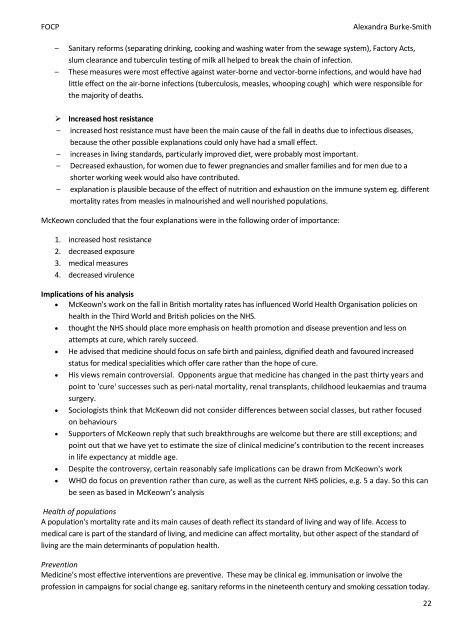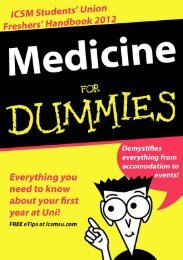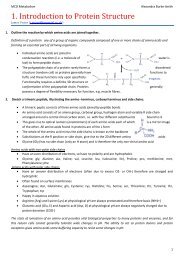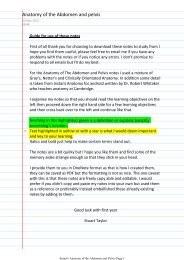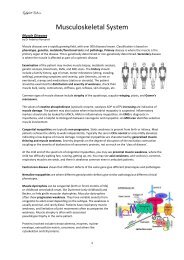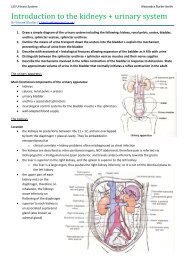1. Introduction to Medical Sociology
1. Introduction to Medical Sociology
1. Introduction to Medical Sociology
You also want an ePaper? Increase the reach of your titles
YUMPU automatically turns print PDFs into web optimized ePapers that Google loves.
FOCP Alexandra Burke-Smith<br />
– Sanitary reforms (separating drinking, cooking and washing water from the sewage system), Fac<strong>to</strong>ry Acts,<br />
slum clearance and tuberculin testing of milk all helped <strong>to</strong> break the chain of infection.<br />
– These measures were most effective against water-borne and vec<strong>to</strong>r-borne infections, and would have had<br />
little effect on the air-borne infections (tuberculosis, measles, whooping cough) which were responsible for<br />
the majority of deaths.<br />
� Increased host resistance<br />
– increased host resistance must have been the main cause of the fall in deaths due <strong>to</strong> infectious diseases,<br />
because the other possible explanations could only have had a small effect.<br />
– increases in living standards, particularly improved diet, were probably most important.<br />
– Decreased exhaustion, for women due <strong>to</strong> fewer pregnancies and smaller families and for men due <strong>to</strong> a<br />
shorter working week would also have contributed.<br />
– explanation is plausible because of the effect of nutrition and exhaustion on the immune system eg. different<br />
mortality rates from measles in malnourished and well nourished populations.<br />
McKeown concluded that the four explanations were in the following order of importance:<br />
<strong>1.</strong> increased host resistance<br />
2. decreased exposure<br />
3. medical measures<br />
4. decreased virulence<br />
Implications of his analysis<br />
� McKeown's work on the fall in British mortality rates has influenced World Health Organisation policies on<br />
health in the Third World and British policies on the NHS.<br />
� thought the NHS should place more emphasis on health promotion and disease prevention and less on<br />
attempts at cure, which rarely succeed.<br />
� He advised that medicine should focus on safe birth and painless, dignified death and favoured increased<br />
status for medical specialities which offer care rather than the hope of cure.<br />
� His views remain controversial. Opponents argue that medicine has changed in the past thirty years and<br />
point <strong>to</strong> 'cure' successes such as peri-natal mortality, renal transplants, childhood leukaemias and trauma<br />
surgery.<br />
� Sociologists think that McKeown did not consider differences between social classes, but rather focused<br />
on behaviours<br />
� Supporters of McKeown reply that such breakthroughs are welcome but there are still exceptions; and<br />
point out that we have yet <strong>to</strong> estimate the size of clinical medicine’s contribution <strong>to</strong> the recent increases<br />
in life expectancy at middle age.<br />
� Despite the controversy, certain reasonably safe implications can be drawn from McKeown's work<br />
� WHO do focus on prevention rather than cure, as well as the current NHS policies, e.g. 5 a day. So this can<br />
be seen as based in McKeown’s analysis<br />
Health of populations<br />
A population's mortality rate and its main causes of death reflect its standard of living and way of life. Access <strong>to</strong><br />
medical care is part of the standard of living, and medicine can affect mortality, but other aspect of the standard of<br />
living are the main determinants of population health.<br />
Prevention<br />
Medicine’s most effective interventions are preventive. These may be clinical eg. immunisation or involve the<br />
profession in campaigns for social change eg. sanitary reforms in the nineteenth century and smoking cessation <strong>to</strong>day.<br />
22


